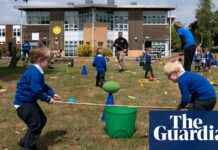In the world of early education, the impact of the pandemic is still being felt, particularly in the behavior of young students. Kindergarten and pre-K children have experienced noticeable declines in self-regulation, social skills, and language development due to the recent upheaval.
Becca Carter, an Instructional Specialist at Virginia Beach City Public Schools, witnesses these challenges on a daily basis. In a conversation with eSchool News, Becca and Srikar Dronam, Vice President of Product Innovation at Hatch Early Learning, Inc., stress the importance of enhancing early childhood education to address these issues effectively.
Key topics discussed include:
– Screen Time: The increased reliance on screens during remote learning has had both positive and negative effects. While technology is essential, it is crucial to limit screen time and prioritize hands-on learning experiences to prevent overdependence on digital devices.
– Teacher and Faculty Adaptations: Educators have had to adapt their teaching methods to accommodate the use of screens and cater to students with varying levels of readiness. Professional development now focuses on utilizing technology appropriately and reintroducing developmentally appropriate practices into the classroom.
– Family Involvement: The role of families in education has become more prominent, with parents taking a more active role in their children’s learning during remote education. Effective communication between parents and teachers is essential for maintaining continuity in learning and supporting behavioral development.
– Future Outlook: Becca and Srikar are optimistic about the future of early childhood education. They advocate for expanding pre-K opportunities and utilizing technology in ways that align with children’s developmental needs to ensure long-term success.
In conclusion, the collaborative efforts of educators, parents, and experts in the field of early childhood education are crucial in addressing the challenges faced by young students in the current educational landscape. By implementing strategies that balance technology with hands-on learning experiences, providing professional development for teachers, fostering strong parent-teacher relationships, and advocating for the advancement of early education opportunities, we can work towards a brighter future for our children.







